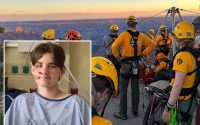Hurricane Helene death toll hits 200 amid search and rescue efforts
BLACK MOUNTAIN, N.C. — Hurricane Helene’s death toll reached 200 on Thursday and could rise higher still, as searchers made their way toward the hardest to reach places in the mountains of western North Carolina, where the storm washed out roads and knocked out electricity, water and cellular service.
Officials in Georgia and North Carolina added to their states’ grim tallies, padding an overall count that has already made Helene the deadliest storm to hit the U.S. mainland since Hurricane Katrina in 2005.
A week after the storm came ashore in Florida before carving a path of destruction through the Southeast, connections between friends, neighbors and even strangers have provided hope in the worst-affected areas.
While government cargo planes brought food and water to these areas and rescue crews waded through creeks searching for survivors, those who made it through the storm leaned on one another for support.
Sarah Vekasi, who makes and sells pottery out of her Sarah Sunshine Pottery store in Black Mountain, North Carolina, said she’s struggling with the trauma of Hurricane Helene and uncertainty about the future of her business.
“All I can say is that I’m alive. I’m not doing great. I’m not doing good. But I’m extremely grateful to be alive, especially when so many are not,” Vekasi said.
One thing that makes her feel a little better is the fellowship of the daily town meeting at the square.
“It’s incredible being able to meet in person,” said Vekasi, who was cut off by impassible roads for days. More than 150 people gathered for Wednesday’s session, as local leaders stood atop a picnic table shouting updates.
Martha Sullivan took careful notes so she could share the information — roads reopened, progress in getting power restored, work on trying to get water flowing again — with others.
Sullivan, who has lived in Black Mountain for 43 years, said her children invited her to come to Charlotte after the storm, but she wants to stay in her community and look after her neighbors.
“I’m going to stay as long as I feel like I’m being useful,” Sullivan said.


